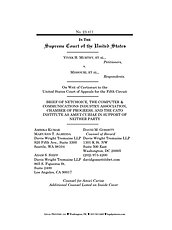Learn more about Cato’s Amicus Briefs Program.
Five social media users and two states (Missouri and Louisiana) have sued a litany of federal agencies and officials for alleged First Amendment violations. These users allege that the federal officials pressured social media companies with statements–both public and private–coercing the companies to make choices they otherwise wouldn’t have. The users allege that as a result of this pressure, their online speech was removed, downgraded, or otherwise stifled. Although these choices were ostensibly made by the social media sites, the users insist that “government officials were the ones pulling the strings.”
A federal district court largely agreed with the social media users and placed several limitations on the ways that government officials may communicate with social media companies going forward. On appeal, the Fifth Circuit narrowed those restrictions, but still left many in place. Now the case is at the Supreme Court, where the federal government is arguing that it did nothing wrong and that these restrictions should be removed entirely. Cato has joined NetChoice, the Computer & Communications Industry Association, and Chamber of Progress in an amicus brief supporting neither party.
In our brief, we focus not on who should win this particular case, but rather on the larger principles at stake in how the Supreme Court decides this case. First, we urge the Court to acknowledge that government pressure against speakers or platforms, known as “jawboning,” raises serious First Amendment concerns. All too often, government agencies and officials attempt to suppress speech informally when they could not legally do so formally. At a certain point, as the Supreme Court held in Bantam Books v. Sullivan (1963), such pressure becomes so coercive as to violate the First Amendment. Whether applied to old media like book publishers or new media like online platforms, such pressure should be discouraged, and courts should vigorously police its permissible boundaries.
At the same time, courts should also make clear that such pressure does not transform platforms like social media companies into “state actors.” Publishers and social media networks do not become the government even when they fall under intense pressure from the government. They are unlike private “company towns” that function like local governments for all intents and purposes. Checks upon government discretion, like the First Amendment, do not apply to private entities like social media platforms. Courts should thus make clear, when reviewing jawboning claims, that the government itself is the proper defendant, not the private platforms. If courts instead erroneously allowed suits to be brought against private platforms to enforce public First Amendment standards, it would ironically lead to a loss of the private speech rights of those platforms. The platforms would lose their own vital First Amendment freedom to choose what speech they publish.
Jawboning cases like this one are likely to reach the courts with increasing frequency in the social media age. When reviewing these cases, courts should be careful to strike an approach that protects the speech rights of both social media platforms and their users. The Supreme Court should give guidance to the lower courts so that they can strike that proper balance.
View this case’s court docket, including the full opinion, here.

This work is licensed under a Creative Commons Attribution-NonCommercial-ShareAlike 4.0 International License.


